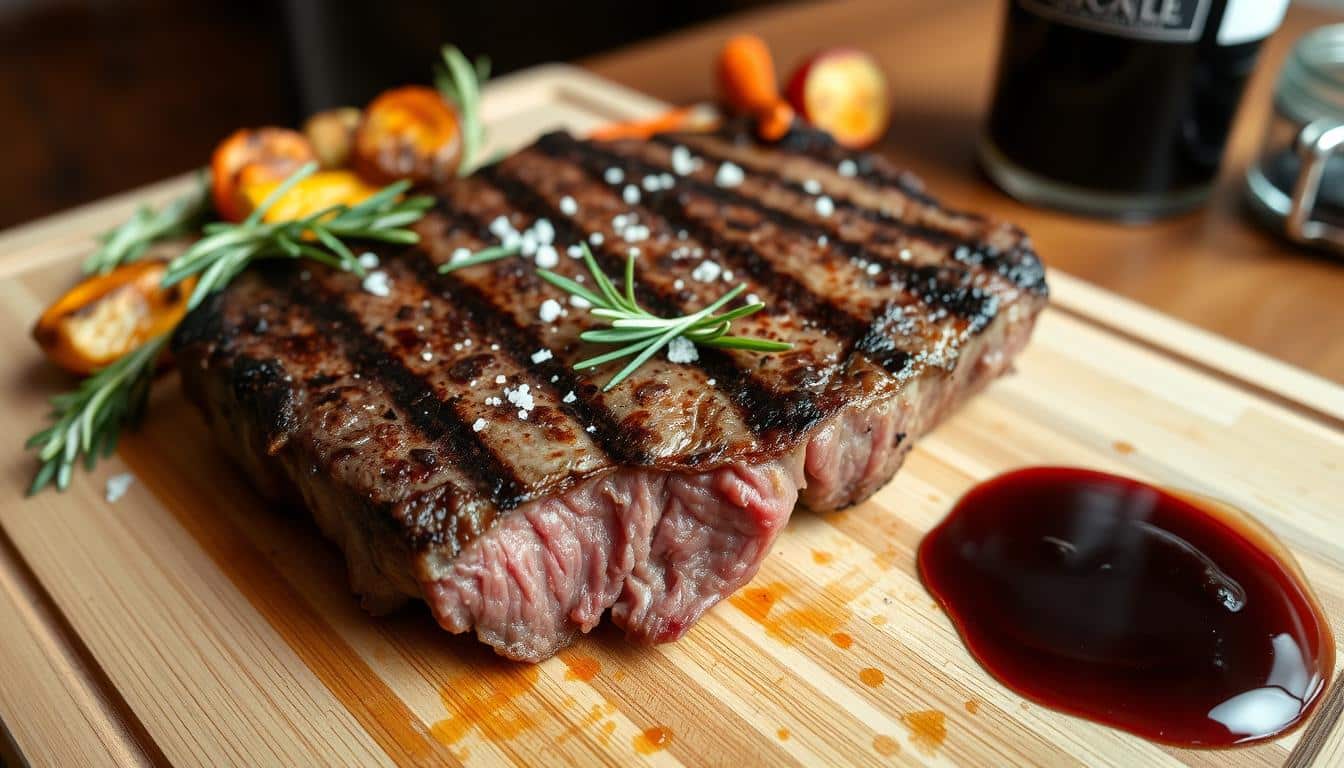We’ll show you how to make a delicious New York Strip Steak. This cut is famous for its rich taste and soft texture. Our tips will help you cook like a pro, whether you’re a chef or a home cook.
This guide covers everything from picking the best steak to cooking it perfectly. You’ll learn how to choose the right steak, prepare it, and cook it just right. We’ll teach you both grilling and pan-searing methods.
Ready to wow your family and friends with your steak skills? Let’s explore the world of premium steaks and improve your cooking!
Understanding the New York Strip Steak
The New York Strip steak is a favorite among beef lovers. We’ll look into its history, what makes it special, and why it’s a top choice for steaks.
Origins and Cut Location on the Cow
New York Strip comes from the short loin of the cow. This spot is behind the ribs and before the sirloin. It’s a tender area because the cow doesn’t move much there.
Cattle ranches work hard to raise cows for top-quality beef. This includes the New York Strip.
Marbling and Grade Classifications
Marbling is the fat inside the meat that adds flavor and tenderness. The USDA grades beef by how much marbling it has. Prime is the best, followed by Choice and Select.
New York Strip steaks are often Prime or Choice. This makes them very popular among steak fans.
| USDA Grade | Marbling Level | Typical Price Range |
|---|---|---|
| Prime | Abundant | $25-$50 per pound |
| Choice | Moderate | $15-$25 per pound |
| Select | Slight | $10-$15 per pound |
Why Choose New York Strip Over Other Cuts
New York Strip is tender and flavorful. It has less fat than a ribeye but more than a sirloin. This makes it great for many cooking ways.
The strip’s strong beef taste and firm texture are loved by steak fans. They prefer a leaner but tasty cut.
“The New York Strip is the perfect combination of texture and taste, delivering a truly satisfying steak experience.”
Selecting Premium Quality Beef
Choosing the perfect New York Strip Steak starts at the butcher shop. We’ll guide you through selecting premium steaks. We’ll compare fresh and dry-aged options and find the ideal thickness for your cooking needs.
What to Look for at the Butcher Shop
When visiting a butcher shop, look for bright red meat with white marbling. The fat should be creamy white, not yellow. Ask your butcher about the beef’s origin and grade.
Prime grade offers the best marbling and flavor. Choice and Select are also good options.
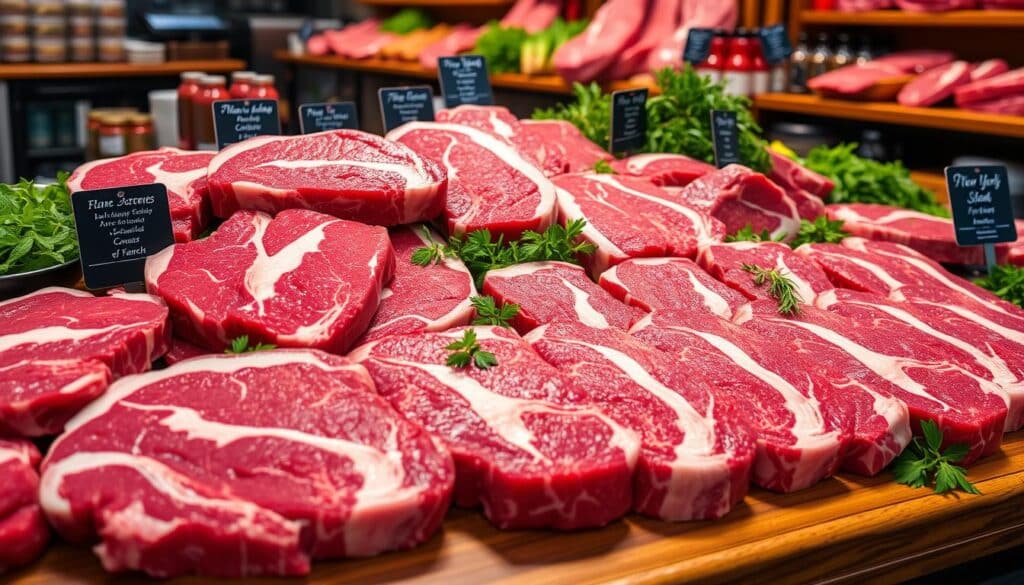
Fresh vs. Dry-Aged Options
Fresh beef is readily available and less expensive. Dry-aged beef undergoes a process that enhances flavor and tenderness. Dry-aging concentrates the beef’s taste, resulting in a more intense, nutty flavor profile.
While pricier, dry-aged beef offers a unique culinary experience.
| Characteristic | Fresh Beef | Dry-Aged Beef |
|---|---|---|
| Flavor | Mild, beefy | Intense, nutty |
| Tenderness | Varies | Very tender |
| Cost | Lower | Higher |
| Availability | Widely available | Limited |
Optimal Thickness and Size
For the best results, choose New York Strip steaks that are 1 to 1.5 inches thick. This thickness allows for a nice crust while maintaining a juicy interior. A 12 to 16-ounce steak is ideal for one serving, providing a satisfying meal without overwhelming the palate.
Essential Tools and Equipment
To cook a perfect New York Strip Steak, we need the right tools. Professional chefs use specific equipment to achieve restaurant-quality results. Let’s explore the must-have items for your kitchen arsenal.
A reliable meat thermometer is first on our list. This tool ensures your steak reaches the desired doneness without guesswork. A digital instant-read thermometer is ideal for quick and accurate readings.
Next, invest in a quality grill or cast-iron skillet. These are essential for mastering various grilling techniques. A heavy-duty grill brush keeps your cooking surface clean and ready for use.
Tongs are key for handling steaks without piercing them. Long-handled tongs provide safety when working with high heat. A sharp chef’s knife is indispensable for trimming and slicing your cooked steak.
“The right tools can elevate your cooking from good to great. They’re the secret weapons in any chef’s arsenal.”
Let’s compare some essential tools found in professional kitchens and home setups:
| Tool | Professional Kitchen | Home Kitchen |
|---|---|---|
| Grill | Commercial-grade grill | Backyard grill or indoor grill pan |
| Thermometer | Thermocouple thermometer | Digital instant-read thermometer |
| Knife | High-end chef’s knife | Quality stainless steel knife |
| Tongs | Heavy-duty stainless steel | Heat-resistant silicone-tipped |
With these tools, you’ll be well-equipped to create steakhouse-worthy meals at home. Remember, quality equipment can make a significant difference in your cooking results. It helps you achieve that perfect restaurant menu taste.
Preparing Your Steak Before Cooking
Getting your New York Strip Steak ready is key for great taste and texture. We’ll show you how to make sure your steak is perfect for grilling or pan-frying.
Room Temperature Timing
Take your steak out of the fridge 30-60 minutes before cooking. This lets it warm up evenly, ensuring it cooks well.
Seasoning Techniques
Pat the steak dry with paper towels. Then, sprinkle it with salt and black pepper. For extra taste, try a dry rub with garlic, onion, and paprika.
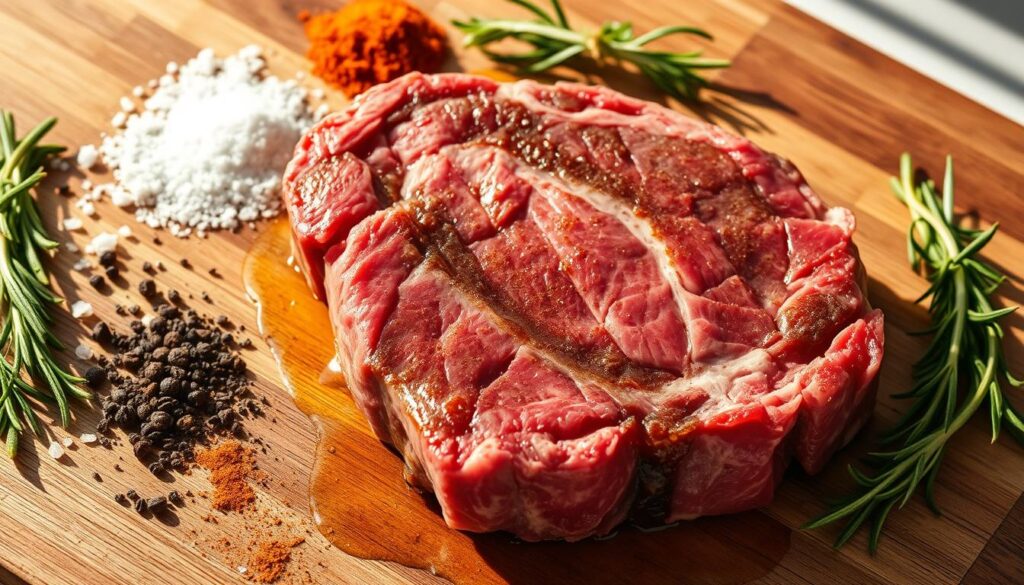
Marinade Options and Timing
A good New York Strip doesn’t need marinating, but it can add flavor. Mix olive oil, soy sauce, garlic, and herbs for a marinade. Marinate for 2-4 hours in the fridge, but don’t overdo it to keep the meat tender.
- Basic marinade: 1/4 cup olive oil, 1/4 cup soy sauce, 2 cloves minced garlic, 1 tbsp fresh herbs
- Citrus marinade: Add lemon or lime juice to the basic recipe
- Bourbon marinade: Replace soy sauce with bourbon for a rich flavor
Proper preparation is the first step to grilling success. Whether you season it or marinate, these steps will make your steak delicious.
Mastering the Perfect Temperature
Getting the right temperature is key to cooking a New York Strip Steak just right. We’ve learned this through lots of practice and careful grilling. Our menu has steaks cooked to different levels, so everyone can find their favorite.
For rare steaks, we aim for 125°F inside. Medium-rare fans like it at 135°F. Medium steaks are 145°F, and medium-well and well-done are 150°F and 160°F respectively. These temps help us get consistent results every time.
We use top-notch meat thermometers to get these exact temperatures. Instant-read digital thermometers are super helpful. They let us check the steak’s temperature fast and accurately, so we don’t have to guess.
One technique we use is the reverse sear method. We cook the steak low and slow, then sear it high. This method helps us control the temperature better and makes the steak cook more evenly.
Getting good at temperature control takes time, but it’s worth it. Once you master it, you can cook steaks like a pro at home. Remember, patience is key to getting that perfect doneness.
| Doneness | Internal Temperature | Center Color |
|---|---|---|
| Rare | 125°F | Red |
| Medium-Rare | 135°F | Pink |
| Medium | 145°F | Light Pink |
| Medium-Well | 150°F | Slightly Pink |
| Well-Done | 160°F | Brown |
Grilling Techniques for Restaurant-Quality Results
Learning how to grill is essential for making top-notch steaks at home. We’ll look at ways to make your New York Strip steak amazing. It will be as good as those in fancy restaurants.
Direct vs. Indirect Heat Methods
Direct heat grilling means cooking right over the flames. It’s great for searing and adding flavor. Indirect heat is better for thicker cuts, as it cooks them evenly.
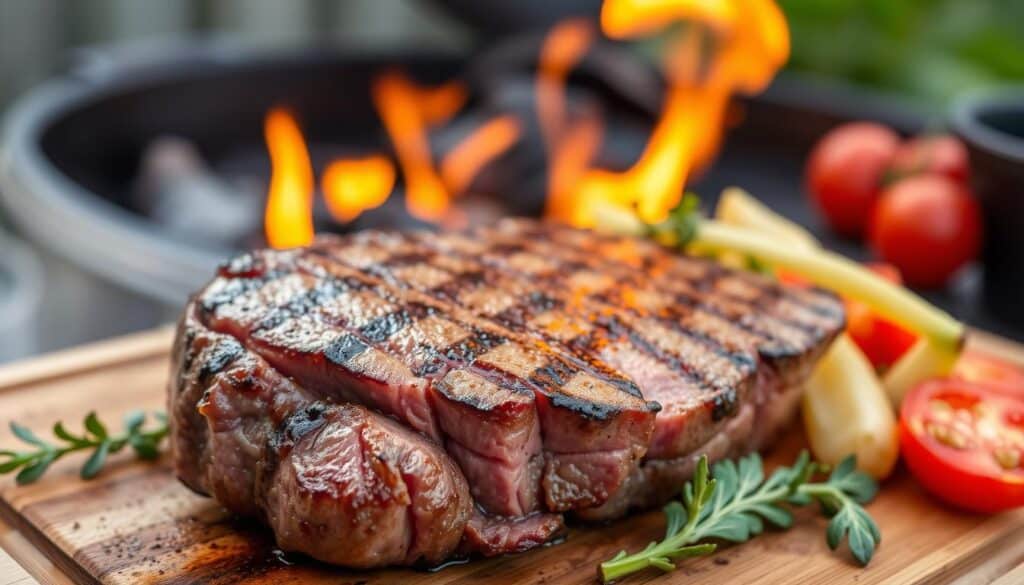
Timing for Different Doneness Levels
To get your steak just right, timing is everything. For a medium-rare New York Strip, cook for 4-5 minutes on each side. Adjust the time for other doneness levels:
- Rare: 3-4 minutes per side
- Medium: 5-6 minutes per side
- Well-done: 7-8 minutes per side
Flipping and Moving Techniques
Flipping your steak right is key for even cooking and great grill marks. Flip it only once, using tongs to avoid damaging the meat. To get crosshatch marks, turn the steak 45 degrees halfway through cooking on each side.
This method not only looks good but also makes your steak taste like it’s from a fancy restaurant. Your guests will be impressed by your cooking skills.
Pan-Searing Methods for Indoor Cooking
When it’s too cold to grill, pan-searing is a great indoor option. It’s a top choice in restaurants for cooking steaks. This method makes steaks as good as those grilled outside.
Cast Iron vs. Stainless Steel Pans
The pan you choose can change your steak’s taste. Let’s look at cast iron and stainless steel pans:
| Feature | Cast Iron | Stainless Steel |
|---|---|---|
| Heat Retention | Excellent | Good |
| Heat Distribution | Even | Less even |
| Searing Ability | Superior | Very good |
| Maintenance | Requires seasoning | Easy to clean |
Butter Basting Technique
Butter basting adds flavor and cooks the steak well. Here’s how to do it:
- Sear the steak on high heat for 3-4 minutes per side.
- Add butter, garlic, and herbs to the pan.
- Tilt the pan and spoon the melted butter over the steak repeatedly.
- Continue for 1-2 minutes until the steak reaches desired doneness.
This method makes your steak taste like it’s from a fancy restaurant. It’s a way to make any steak at home taste amazing.
Resting and Serving Your Steak
After cooking your New York Strip Steak to perfection, resting is key. This step lets juices spread out, making the steak tender and flavorful. Let it rest for 5-10 minutes, covered with foil to stay warm.
While it rests, set up your plate like a fancy restaurant. Put your sides and garnishes in a nice order. A colorful veggie mix or a fresh salad can make the rich beef tenderloin even better.
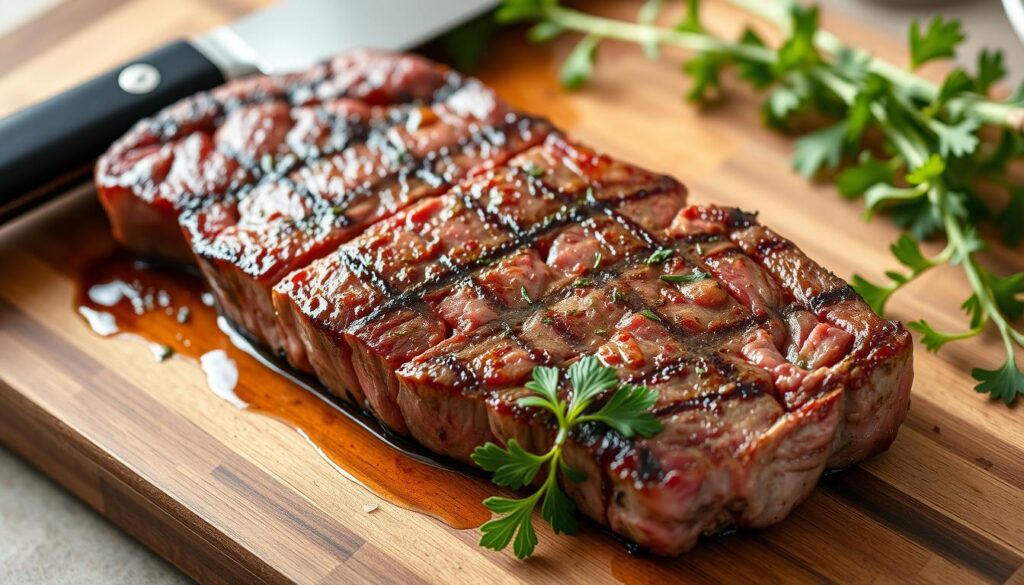
To make your steak look like it’s from a fancy restaurant, slice it against the grain. This makes it tender and looks great. Place the slices in a fan shape on your plate, showing off the pink center.
“A well-rested steak is the hallmark of a great chef. It’s the difference between good and extraordinary.”
Here are some tips to make your meal feel like a special occasion:
- Use warm plates to keep the steak hot longer
- Drizzle any collected juices over the sliced meat
- Add a pat of compound butter for extra flavor and visual appeal
- Garnish with fresh herbs like rosemary or thyme
| Resting Time | Steak Thickness | Final Temperature Rise |
|---|---|---|
| 5 minutes | 1 inch | 3-5°F |
| 10 minutes | 1.5 inches | 5-10°F |
| 15 minutes | 2 inches | 10-15°F |
Complementary Sauces and Side Dishes
A perfectly cooked New York Strip steak needs great sides. We’ll look at classic sauces, wine pairings, and sides that make your steak dinner special.
Classic Steak Sauce Recipes
Make your steak better with homemade sauces. Try béarnaise or chimichurri. Or mix butter, herbs, and garlic for a tasty compound butter.
Wine Pairing Suggestions
The right wine makes your steak dinner better. A bold Cabernet Sauvignon or smooth Malbec is great. For white, choose a full-bodied Chardonnay.
Vegetable and Starch Accompaniments
Balance your plate with veggies and starches. Roasted asparagus or sautéed mushrooms are perfect. For starches, try garlic mashed potatoes or crispy twice-baked potatoes.
| Side Dish | Preparation Method | Pairing Notes |
|---|---|---|
| Grilled Vegetables | Brush with olive oil, season, grill | Adds freshness to rich steak |
| Truffle Fries | Deep-fry, toss with truffle oil and parmesan | Luxurious complement to beef |
| Creamed Spinach | Sauté spinach, add cream sauce | Classic steakhouse side |
The secret to a great steak dinner is balance. Your perfectly cooked New York Strip and its sides must work together. Try different combinations to find your favorite meal at home.
Conclusion
We’ve looked into cooking the perfect New York Strip Steak. We talked about picking the best steaks and learning different cooking ways. By using our guide, you can make your steak dishes better and enjoy restaurant-quality meals at home.
The secret to a great New York Strip Steak is using top-quality beef. You also need to season it right and control the temperature well. Whether you grill outside or pan-fry inside, these steps will make your steak taste amazing every time.
Now it’s your turn to try these tips. With a bit of patience and practice, you’ll impress everyone with your steak skills. So, get ready to grill or pan-fry, and enjoy the tasty flavors of a perfectly cooked New York Strip Steak!

